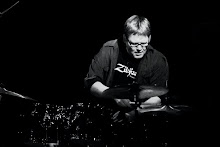I can't remember if I've mentioned this before, but I grew up playing in marching bands. I played bass drum, snare drum, tri-toms, cymbals and glockenspiel in my time with the Lions Band. The Lions Band was not a drum corps ( as we still had reed instruments ) but in the early 80s, the band certainly had drum corps aspirations. I must admit, at first I got caught up in it, but after awhile, I started to see elements in it that were problematic. Let's look at a few, shall we?
1. Drumset is an instrument born of individual, not group thinking.
The trap set's early objective was to take a role that was performed by two drummers, that is, badd drum and snare drum, and have an INDIVIDUAL perform this function. Drum corps, with it's emphasis on uniformity, is the antithesis of this. I personally don't think it's always healthy to have stickings to a particular passage dictated to us. Stickings are a mode of expression, and the main reason I switched to glockenspiel was that, even within the confines of the marching band, i got a bit of my individuality back, as no one else was playing my instrument.
2. Drum Corps values technique over sound.
Modern American marching snare drums tend to sound ( and feel ) like tabletops. The harder (tighter) the drums surface, the more bounce. The snares are on super tight, creating a super dead, dry, sound that helps show off the uniformity of the players. To me, it's a very uninspiring sound, and all the Corps' drums tend to sound the same.
3. Only certain techniques are valued.
Ever notice how none of the lists of rudiments has any buzz rudiments ( other than the one buzz roll ) or any dead stroke rudiments. Why? Because most of those lists are decided by DRUM CORPS instructors, and buzzes and dead strokes sound crappy on the table top sounding drums when 20 people are playing them out in a field. But you know what? Those are very valid ways of playing a drum, and classical and drum set players use those techniques all the time!
4. Timekeeping in undervalued.
My experience is that ham-fisted playing with massive sticks on the table top drums generally doesn't involve the concept that time-keeping is an art form. In the band I was in, there were times when some snare drummers were asked to play quarter notes and couldn't keep them in time! That's as fundamental as any rudiment, as far as I'm concerned.
5. If you think the employment opportunities for a drum set player are limited......
I had peers that went to the states to join DCI ( Drum Corps International ) bands after they finished high school, to spend their summers playing in football fields and sleeping in school gymnasiums. That's all good if you have a passion to do that, but it really doesn't lead to anything career-wise except a lot of student debt. At least if you play with a local country band between semesters of university, you come back with experience and a bit of money in your pocket.
So, if you feel compelled by the competition, patriotism ( something Americans are VERY good at ) and all that implies ( Don't get me started on the whole colour guard/rifles thing. Shudder! ) go for it. Just don't be surprised if, in the process of becoming a sensitive, original, light-touch drum set player, that you might have some unlearning to do afterwards.
Please note that the opinions expressed above are mine only. Don't send Tom Float over to my place or anything.........
Thursday, July 4, 2019
Subscribe to:
Post Comments (Atom)

No comments:
Post a Comment